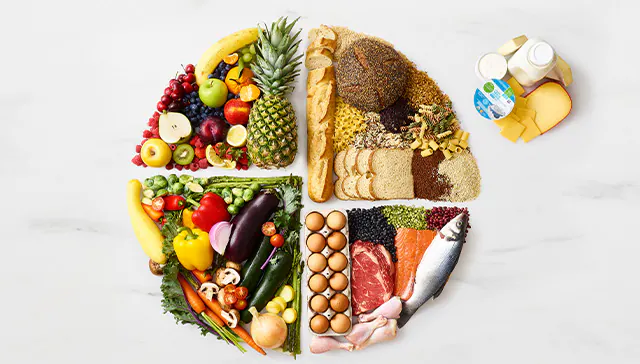
Nutrition Guides and Tips
Nutrition Hub
Health Nourishment
In our unwavering dedication to promoting healthy living, we present a comprehensive range of resource materials designed to enlighten and empower individuals seeking to improve their nutrition and overall well-being. Our curated collection extends from enlightening articles and educational eBooks to enlightening videos and interactive tools – all meticulously handpicked to ignite your curiosity and foster a deeper grasp of the world of nutrition.

Healthy Recipes
Discover the latest recipes and nourish your knowledge with our easy-to-follow recipes and healthy ingredient replacements.

Healthy Eating 101
Gain valuable insights that will lead you to optimal nutrition.

Nutrition Guides
Your personalized roadmap to achieving optimal health. Simple, practical, and all-inclusive.
FAQs
Common Questions Answered
Find answers to frequently asked questions about nutrition and dieting.
should I include high amounts of fiber in my diet?
Yes. Gut bacteria, also known as your microbiome, are living organisms that feed on the fiber in your diet. Just like a house pet you have in your home, these organisms need to be fed in order to live. High-quality fiber sources allow your body to sustain a healthy basal metabolic rate by feeding and promoting what we call “the good bacteria”.
How much protein should I consume?
The average adult should consume roughly three-quarters (0.75g) of protein per their body weight each day. This promotes muscle growth and keeps your metabolism on fire.
What is the difference between healthy fat and unhealthy fat?
Unsaturated fats, monounsaturated fats, and polyunsaturated fats are healthy fats that can lower cardiovascular risk and hypertension (high blood pressure). Omega-3 fatty acids and Omega-6 fatty acids are essential and should stay in balance with each other.
Saturated fats from badly sourced meats and in large quantities each day can increase cardiovascular risks. However, when consumed from good sources, (i.e. grass-fed meat, pasture-raised poultry) in moderation they are more of a cause for good than bad as they contain essential nutrients and amino acids which can promote health.
The types of fats that you should eliminate from your diet completely are trans fats. It is a major promoter of heart disease. Trans fats come from liquid oils being transformed into solid fats. Eating a lot of refined foods like chips, hydrogenated oils, or burning oils at higher smoke points than recommended is how this type of fat can be consumed without you even knowing it.
What are some good strategies to increase my water intake?
The U.S. National Academies of Sciences recommends that the average male should consume 3.7 liters of water per day while the average woman should consume 2.7 liters.
An easy tip for starters is to drink a glass of water immediately upon waking up to start your day. This will make you alert and give you an immediate boost of energy. It also keeps you motivated to keep this up throughout the day since mentally you will feel like you had a good start.
Supplement regular plain water with a splash of citrus from a natural source like lemon. Sparkling water has gained popularity over the years and is a welcome change of pace while still adding to your total water intake for the day.
What is the food tie-dye?
Understand our Vitamin Tie-Dye color food rainbow guide.
Fuel Your Health Today
Enhance your health journey with our transformative expertise.
- Complete Food Wellness
- Nutrition-Approved Recipes
- Optimal Nutritional Guidance
- Wholesome Harmony
- Health Boosts and Progress

